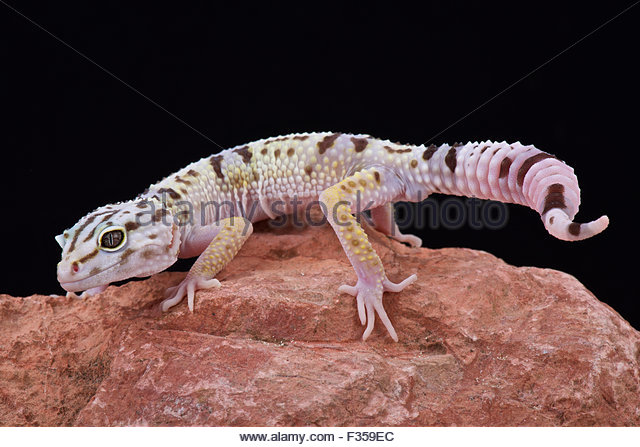ANIMAL: Iranian Eyelid Gecko Eublepharis angramainyu Type of Animal: Gecko Habitat: Semi-desert, gypsum, stony hills, ruins Location(s): WC Iran, N Iraq, NE Syria, & SE Turkey Appearance: Visible ear holes, short thick tapered tail, pale yellow w/ pattern of dark stripes & spots, tail top sometimes has blue, feet/snout/tail tip have pinkish tinge Food/Diet: Insects, insect larvae, spiders, eggs, smaller lizards (including young of own species), young mice, worms, scorpions Status in Wild: Stable Conservation: Breeding from zoos & wildlife centers Lifestyle: Solitary or small trios of a male & 2 females Additional Info: Called: Male Female Young-Hatchling Group-Leap/Colony Weight: Male-3.06 oz Female-2.88 oz Young-0.36 oz Gestation: 1 month Life Span: 10 years in wild, 15 years in captivity Body Length: Male-9.5-10.5 in Female-8-9.5 in Young-4 in Tail Length: Male-3.31 in Female-2.65 in Young-1.34 in Main predators of adults are snakes, birds, larger lizards, dogs, foxes, cats, wildcats, weasels, mongooses, polecats, jackals, hyenas, camel spiders, large hunting spiders, frogs, wolves, & bears. Adult geckos & scorpions prey on young. Also known as Iranian Fat-Tailed Gecko, Iraqi Eyelid Gecko, & Western Leopard Gecko. They’re in same genus as popular leopard geckos. Toes lack lamellae (sticky toe pads), reducing climbing ability. Instead, they have small claws improving traction while crawling across ground. Coloration is perfect for camouflage. Tail acts as fat reserve, making tail shedding last resort. Either crepuscular (active at dawn & dusk) or nocturnal. Unlike many lizards, geckos can vocalize. These geckos give high-pitched squeaks when captured & sometimes attempt to bite. One possible threat is pet trade. Fun Fact(s): Angramainyu part of scientific name refers to Angra Mainyu, Zoroastrian spirit of darkness. The subfamily they’re part of (Eublepharinae) is only gecko family w/ eyelids. Like most lizards, it can shed its tail. These tails eventually regenerate. Genus name derived from Latin word meaning good eyelid

